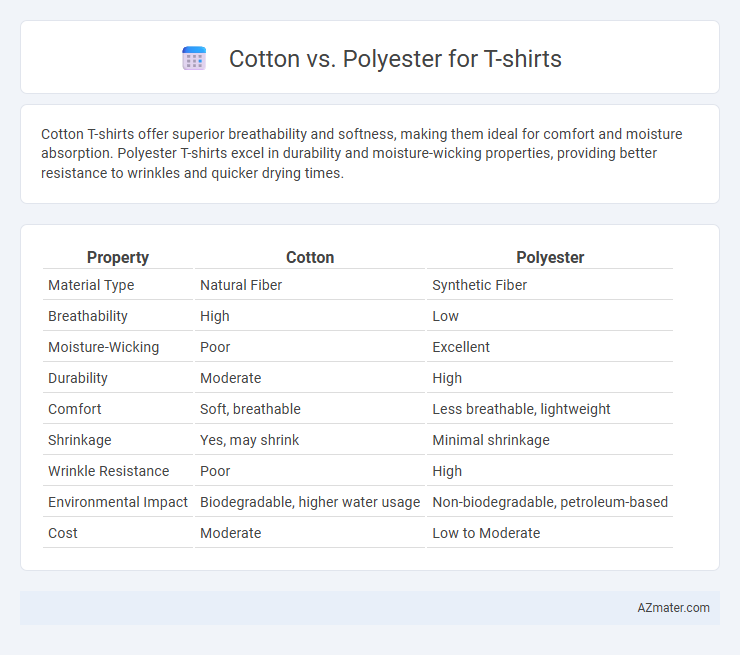Cotton T-shirts offer superior breathability and softness, making them ideal for comfort and moisture absorption. Polyester T-shirts excel in durability and moisture-wicking properties, providing better resistance to wrinkles and quicker drying times.
Table of Comparison
| Property | Cotton | Polyester |
|---|---|---|
| Material Type | Natural Fiber | Synthetic Fiber |
| Breathability | High | Low |
| Moisture-Wicking | Poor | Excellent |
| Durability | Moderate | High |
| Comfort | Soft, breathable | Less breathable, lightweight |
| Shrinkage | Yes, may shrink | Minimal shrinkage |
| Wrinkle Resistance | Poor | High |
| Environmental Impact | Biodegradable, higher water usage | Non-biodegradable, petroleum-based |
| Cost | Moderate | Low to Moderate |
Introduction to Cotton and Polyester Fabrics
Cotton is a natural fiber harvested from the cotton plant, renowned for its breathability, softness, and moisture-absorbing properties, making it ideal for comfortable T-shirts. Polyester, a synthetic fabric derived from petroleum-based polymers, offers durability, wrinkle resistance, and quick-drying features, widely chosen for activewear and performance T-shirts. Understanding the fundamental differences between cotton and polyester fabrics helps consumers select T-shirts based on comfort, functionality, and care preferences.
Key Differences Between Cotton and Polyester
Cotton T-shirts are made from natural fibers, offering superior breathability, softness, and moisture absorption, making them ideal for sensitive skin and hot climates. Polyester T-shirts, composed of synthetic fibers, provide enhanced durability, wrinkle resistance, and quick-drying properties, suitable for activewear and cold weather layering. The key differences lie in cotton's comfort and biodegradability versus polyester's strength and longevity.
Comfort and Feel: Cotton vs. Polyester
Cotton T-shirts offer a soft, breathable texture that naturally wicks moisture, enhancing comfort during extended wear. Polyester fabric provides a lightweight, durable feel with moisture-wicking properties but can trap heat and cause a less breathable sensation. The choice between cotton and polyester for comfort largely depends on personal preference and usage scenarios such as casual wear or athletic activities.
Breathability and Moisture Management
Cotton T-shirts excel in breathability due to their natural fibers, allowing maximum airflow and keeping the skin cool. Polyester offers superior moisture management by wicking sweat away from the skin, facilitating faster drying and reducing dampness during physical activity. Choosing between cotton and polyester depends on whether breathability or moisture control is the priority for comfort and performance.
Durability and Longevity
Cotton T-shirts offer natural breathability and softness but tend to wear out faster, with fibers weakening after repeated washing and exposure to UV rays. Polyester T-shirts excel in durability, resisting shrinking, stretching, and abrasion, which extends their lifespan significantly compared to cotton. Blended fabrics combining polyester and cotton optimize longevity by balancing comfort and resilience, making them ideal for long-lasting wear.
Shrinkage and Wrinkle Resistance
Cotton T-shirts tend to shrink significantly after washing, often up to 5%, due to their natural fiber composition, while polyester fabrics exhibit minimal shrinkage because they are synthetic and more dimensionally stable. Polyester offers superior wrinkle resistance, maintaining a smooth appearance without frequent ironing, whereas cotton wrinkles easily and requires more care to stay crease-free. Choosing polyester enhances garment durability and ease of maintenance, but cotton provides breathability and comfort despite its higher shrinkage and wrinkle tendencies.
Environmental Impact and Sustainability
Cotton T-shirts require significant water usage and pesticide application during cultivation, leading to concerns about soil degradation and water scarcity, while polyester shirts are made from non-renewable petroleum-based resources contributing to microplastic pollution in oceans. Organic cotton reduces chemical use and promotes biodiversity but still demands considerable water, whereas recycled polyester lessens fossil fuel dependence and waste but may release microfibers when washed. Choosing sustainably sourced organic cotton or recycled polyester can mitigate environmental impact and support more sustainable apparel production.
Cost Comparison: Cotton vs. Polyester T-Shirts
Cotton T-shirts typically cost more than polyester due to higher raw material prices and more intensive farming processes. Polyester, derived from petroleum, is cheaper to produce and offers cost-effective durability, making polyester T-shirts more budget-friendly for mass production. Price differences can vary by brand and quality, but polyester often provides a lower-cost alternative without sacrificing performance.
Best Uses and Applications for Each Fabric
Cotton T-shirts are ideal for casual wear, offering breathability and softness that make them perfect for everyday use and warm climates. Polyester T-shirts excel in sports and activewear due to their moisture-wicking properties and durability, making them suitable for workouts and outdoor activities. Blended fabrics combine the comfort of cotton with the performance features of polyester, enhancing versatility across various applications.
Making the Right Choice: Cotton or Polyester for Your T-Shirt
Choosing between cotton and polyester for your T-shirt hinges on comfort, durability, and breathability. Cotton is a natural fiber prized for its softness, moisture absorption, and breathability, making it ideal for sensitive skin and hot climates. Polyester, a synthetic fabric, offers superior wrinkle resistance, durability, and moisture-wicking properties, perfect for active wear and long-lasting use.

Infographic: Cotton vs Polyester for T-shirt
 azmater.com
azmater.com